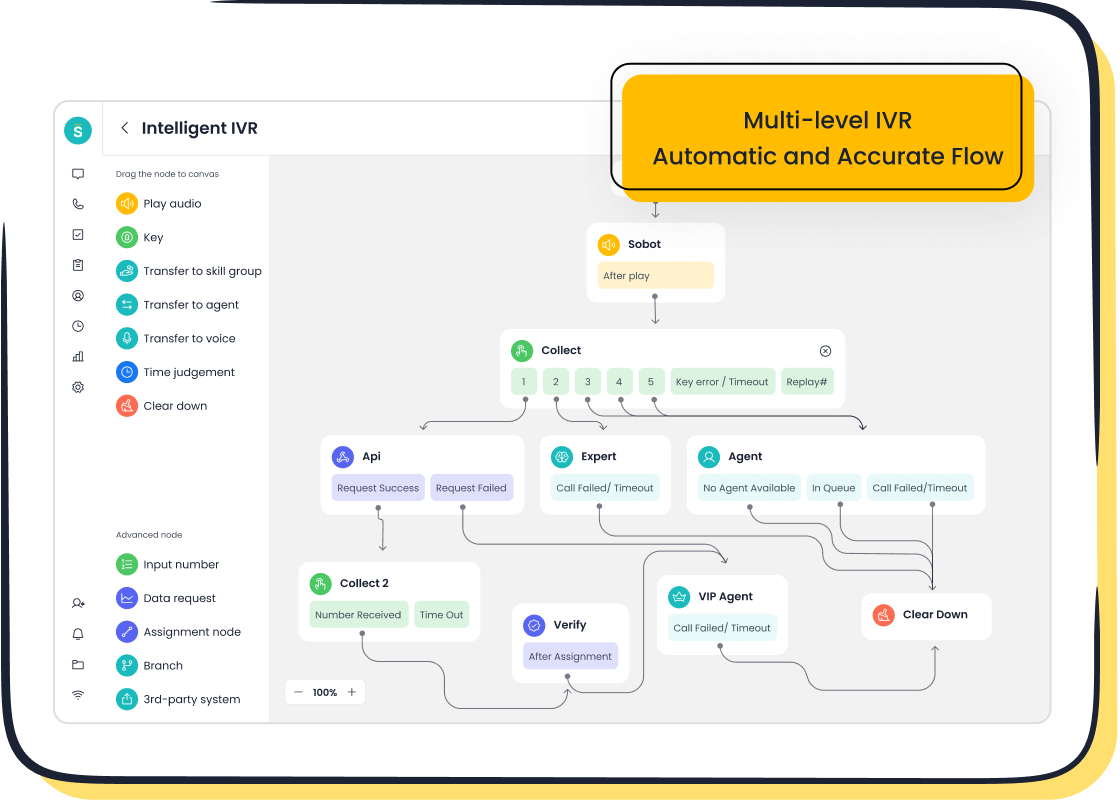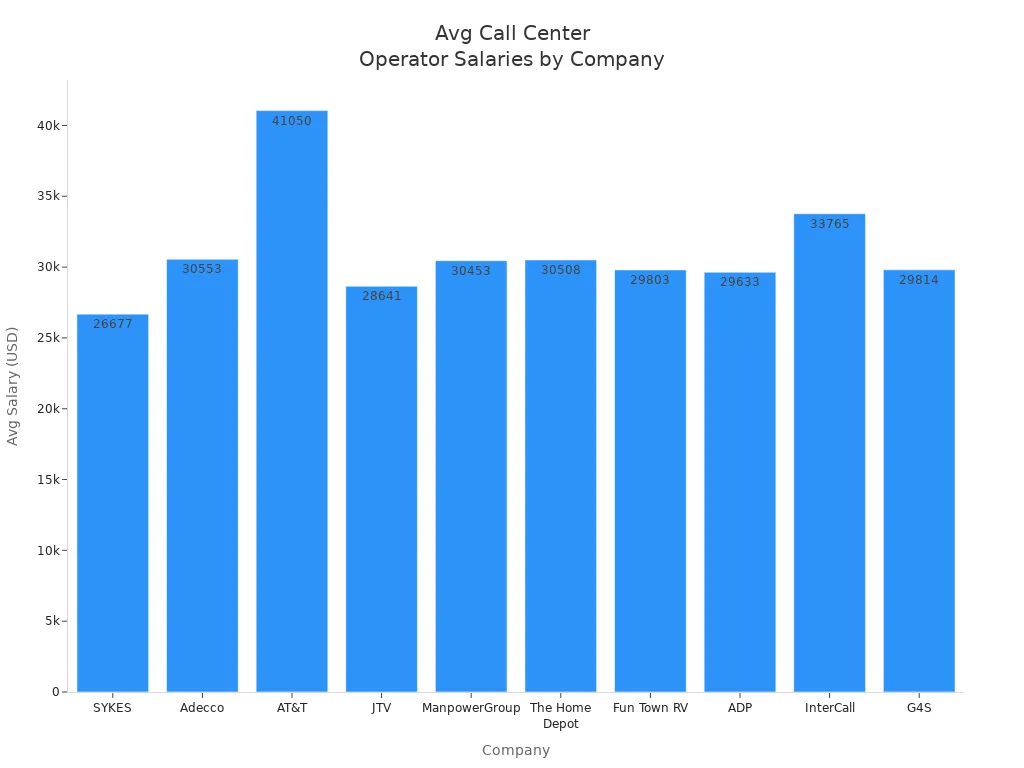Understanding Call Center Operation and Operator Roles

Many people mix up call center operation with the role of a call center operator. Knowing the difference helps you, whether you want to boost your business or plan your career. Research shows that businesses improve efficiency by letting call centers handle complex tasks and letting operators focus on simple calls. This clear split helps everyone work better and keeps customers happy. See the table below for a quick comparison:
| Aspect | Call Center Operation | Call Center Operator |
|---|---|---|
| Role Type | Department handling a broad range of customer calls | Individual job title focused on call answering and directing |
| Scope of Work | Manages inbound/outbound calls including sales, support, marketing | Handles basic customer service calls and call routing |
| Skills Required | Communication, problem-solving, technical and product knowledge | Communication and basic customer service skills |
| Business Benefit | Enables handling complex requests, economies of scale, and efficiency | Provides personalized, local, and simple customer support |
| Job Seeker Benefit | Clarifies need for specialized skills and varied responsibilities | Clarifies focus on basic service and call directing tasks |
Sobot and Sobot AI help companies master both sides by offering smart, all-in-one solutions for every customer interaction.
Call Center Operation

Definition
You may think of a call center operation as a group that handles customer calls for a business. This group can work in one office or from different locations. A call center can have just a few agents or hundreds. These agents answer questions, solve problems, and help with billing or technical issues. Most call centers use special software to track calls and store customer information. This helps agents give better service and solve issues faster. You can measure how well a call center operation works by looking at things like how long customers wait and how many calls each agent answers.
Main Functions
A call center operation does more than just answer phones. You will find that it manages both inbound and outbound calls. Inbound calls come from customers who need help or have questions. Outbound calls are made to reach out to customers for sales, surveys, or follow-ups. The main functions include:
- Providing customer service and technical support
- Handling sales and marketing calls
- Managing customer relationships
- Using IVR (Interactive Voice Response) systems to route calls
- Monitoring call quality and agent performance
- Analyzing data to improve service
A call center operation has a clear structure. Managers set goals, supervisors guide agents, and support staff handle training and technology. This structure helps the team deliver great answering service and meet business goals.
Sobot Voice/Call Center Overview

Modern call center operation uses advanced technology to boost efficiency and service quality. Sobot Voice/Call Center stands out as a leading example. You get an all-in-one platform that supports voice, chat, and even WhatsApp. Sobot uses AI-powered voicebots and chatbots to handle routine questions, so your agents can focus on complex issues. The system offers real-time analytics, call recording, and smart call routing. You can integrate Sobot with your CRM and other tools for a seamless experience. Sobot’s answering service reduces agent workload by up to 60% and improves customer satisfaction scores. Companies like Samsung and Weee! trust Sobot for their call center services. With Sobot, you can deliver fast, reliable, and secure service to your customers every day.
Call Center Operator
Role Definition
You play a vital part as a call center operator. You become the first point of contact for customers who reach out with questions, complaints, or requests. Many industry experts say that call center operators help maintain customer satisfaction and protect a company’s reputation. You handle both inbound and outbound calls, answer inquiries, and provide information about products or services. You may also process orders, payments, and sometimes escalate problems to supervisors. As a call center operator, you often work under titles like customer service representative or contact center agent. Your main goal is to make sure every caller feels heard and supported.
Key Responsibilities
Your daily responsibilities as a call center operator cover a wide range of tasks:
- Manage inbound and outbound calls, addressing customer queries and follow-ups.
- Document call details and customer interactions for quality improvement.
- Stay updated on products and services to answer inquiries accurately.
- Resolve customer problems and escalate unresolved issues to supervisors.
- Use call center software to organize conversation records and maintain data privacy.
- Meet performance goals, such as call duration and customer satisfaction.
- Collaborate with agents and participate in team meetings.
You must handle operator responsibilities with care, as your actions directly affect customer experience. Operators often follow communication scripts, identify customer needs, and sometimes upsell products or services. Your duties also include building strong customer relationships and ensuring every interaction is positive.
Required Skills
To succeed as a call center operator, you need a mix of soft and hard skills. Communication skills, both written and oral, help you interact clearly with customers. Listening skills let you understand customer problems and respond effectively. Empathy and patience are essential for handling frustrated callers and building trust. Problem-solving skills allow you to find quick solutions to unique challenges. Technical proficiency with call center tools, like Sobot’s unified workspace, helps you manage calls efficiently. You also need adaptability, attention to detail, and organizational abilities. Continuous learning and staying updated with industry trends will help you excel in your role. Many companies, including those using Sobot’s solutions, value operators who show these call center operator skills every day.
Customer Service Impact
Call Center Role
You play a key part in shaping customer service quality when you manage a call center. Your answering service must focus on important performance indicators. These include first call resolution, average handle time, and customer satisfaction scores. You can see how each factor affects service in the table below:
| KPI | Description | Impact on Customer Satisfaction Score (CSAT) |
|---|---|---|
| First Call Resolution | Resolving customer issues on the first call | Increases satisfaction and loyalty |
| Average Handle Time | Time spent on each call, including follow-up | Faster support improves experience |
| Customer Satisfaction Score | Direct measure of customer experience | Reflects overall service quality |
| Call Abandonment Rate | Customers who hang up before reaching an agent | Lower rates improve satisfaction |
| Service Level | Speed at which calls are answered | Faster response boosts efficiency |
| Agent Utilization | How well agents use their working hours | Better use reduces wait times |
You can improve customer service by using technology like Sobot’s AI-powered answering service. Sobot helps you monitor calls, analyze data, and automate routine queries. This leads to higher customer satisfaction and more efficient service. Quality assurance programs also help you coach agents and use feedback to keep service standards high. Even a 1% rise in first call resolution can boost customer satisfaction by 1%. You can read more about these metrics at Call Centre Helper.
Operator Role
As a call center operator, you have direct responsibilities that shape every customer interaction. Your answering service skills help you resolve inquiries, build trust, and create a strong customer service experience. When you answer calls, you must listen carefully, provide accurate information, and solve problems quickly. Your responsibilities include:
- Handling customer queries with patience and empathy
- Documenting each call for quality improvement
- Following up on unresolved issues
- Using call center tools to manage information
- Meeting service goals set by your team
You help increase customer satisfaction by resolving issues on the first call. Customers value knowledgeable and friendly call center operators. High turnover among operators can hurt service quality and lead to longer wait times. When you stay in your role and keep learning, you help your team deliver strong customer service and boost customer retention. Sobot’s unified workspace supports you by making it easy to access customer data and manage answering service tasks. This helps you focus on your main responsibilities and deliver the best service possible.
Skills and Qualifications
For Call Center Operation
You need a strong set of skills and qualifications to manage a call center operation. Industry standards, such as ISO 9001, ISO 27001, and ISO 18295, guide you in building a reliable and secure environment for both your team and your customers. These standards focus on process management, data protection, and customer-focused service. Here is a quick look at what these standards require:
| ISO Standard | Key Qualification Requirements for Call Center Management |
|---|---|
| ISO 9001 | Process management, customer feedback handling, continuous improvement, documentation control, employee training |
| ISO 27001 | Risk management, access control, incident management, data protection, regular audits |
| ISO 18295 | Customer-focused approach, service consistency, performance metrics, complaint handling, staff competence |
You must also develop leadership and communication skills. You guide your team, solve problems quickly, and make decisions that affect daily operations. You need to train employees, coach them, and make sure everyone follows efficient procedures. Emotional intelligence helps you stay patient and approachable. Sobot’s cloud call center platform supports you by offering real-time analytics, workforce management tools, and secure data handling, making it easier to meet these high standards.
Tip: Regular training and feedback sessions help you keep your team’s skills sharp and improve customer satisfaction.
For Call Center Operator
As a call center operator, you play a direct role in customer service. You need strong communication skills to answer questions and solve problems. Listening and empathy help you understand each customer’s needs. Many companies look for operators who have completed basic education and some customer service training. You can boost your career by earning certifications. Here are some popular options:
| Certification Name | Focus Area / Skills Covered | Best Fit For | Key Benefits / Notes |
|---|---|---|---|
| Customer Service Skills — Alison | Fundamental customer service concepts | Newcomers to customer service | Free course; covers handling tough customer interactions |
| CVS Health Call Center Customer Service Prof. | Call center specific customer service skills | Call center operators | Specialized certificate for call center customer service |
| Customer Service Excellence — Mount Royal Univ | Communication, conflict resolution, customer needs | Customer-centric roles | Flexible duration; enhances ability to deliver outstanding service |
You must handle responsibilities like documenting calls, following scripts, and meeting performance goals. Training programs teach you how to manage difficult calls and use call center software. Sobot’s unified workspace helps you organize customer information and manage your responsibilities more efficiently. With the right skills and certifications, you can grow from a call center operator to a supervisor or manager.
Work Environment

Call Center Setting
You will find many types of call center settings in today’s business world. Each setting uses different technology and workflows to meet customer needs. The table below shows the most common types and how they differ:
| Call Center Type | Technology Used | Workflow Characteristics |
|---|---|---|
| Inbound Contact Center | IVR, Automatic Call Distribution, Skill-based Routing | Handles incoming calls, focuses on support and queries |
| Outbound Contact Center | Telemarketing tools, Integrated dialers | Makes outgoing calls for sales, surveys, or lead generation |
| Blended Contact Center | Mix of inbound and outbound technologies | Manages both incoming and outgoing calls, needs complex workflows |
| Multichannel Contact Center | Phone, email, SMS, social media, web/mobile apps | Offers many channels, but each runs separately |
| Omnichannel Contact Center | Integrated channels, customer data and history | Gives seamless service across all channels with full data access |
| Outsourced Contact Center | Third-party tech and services | Uses outside companies for some or all call center work |
| Offshore Contact Center | Similar to outsourced, but in other countries | Supports many languages and time zones, can lower costs |
| Automated Contact Center | AI, Machine Learning, Chatbots, Speech Recognition | Uses automation for routine tasks, less human involvement |
| On-premises Contact Center | Internally managed hardware and software | Full control, higher investment, more maintenance |
| Cloud Contact Center | Internet-based platforms | Flexible, scalable, supports remote agents, easy to access from anywhere |
Sobot’s cloud call center solution fits well in modern settings. You can use it to support remote agents, manage calls globally, and integrate with your CRM. This flexibility helps you adapt to changing business needs and customer expectations.
Operator Experience
As a call center operator, your work environment shapes your daily experience. You may face challenges such as high call volumes, tight budgets, and the need to learn new technology. Here are some common challenges you might encounter:
- Handling fluctuating call volumes that can lead to stress or burnout.
- Adapting to new tools like AI and cloud platforms.
- Managing multiple channels, such as calls, emails, and social media.
- Working night shifts, which can affect your health.
- Meeting high customer expectations and strict performance goals.
Despite these challenges, you can enjoy many benefits. Cloud-based systems like Sobot give you access to unified workspaces and real-time analytics. These tools help you manage your workload and improve your performance. If you have several years of experience, you may find it easier to handle complex tasks and support other agents. Training and support from your company can also make your job more rewarding. As a call center operator, you play a key role in delivering great customer service every day.
Salary and Career Path
Call Center Operation Salary
When you manage a call center operation, your salary often reflects your level of responsibility. Managers and supervisors in call center operations usually earn more than entry-level agents. Your salary can depend on the size of the team, the industry, and your experience. In the United States, call center operation managers often see salaries ranging from $50,000 to $90,000 per year. Directors or higher-level leaders may earn even more. You may also receive bonuses based on performance or customer satisfaction scores. Companies like Sobot help you improve your team’s results, which can lead to higher salary potential. Sobot’s advanced analytics and workforce management tools support your goals and help you reach new salary milestones.
Call Center Operator Salary
As a call center operator, your salary depends on your employer, location, and experience. Many companies in the U.S. offer different pay rates. The table below shows the average salary for call center operator roles at several well-known companies:
| Company | Average Salary (USD) |
|---|---|
| SYKES | $26,677 |
| Adecco | $30,553 |
| AT&T | $41,050 |
| JTV | $28,641 |
| ManpowerGroup | $30,453 |
| The Home Depot | $30,508 |
| Fun Town RV | $29,803 |
| ADP | $29,633 |
| InterCall | $33,765 |
| G4S | $29,814 |

You can see that the average salary for a call center operator ranges from about $26,677 to $41,050. Your salary may increase as you gain experience or take on more responsibilities. Many operators use Sobot’s unified workspace to boost their efficiency, which can help them qualify for higher pay.
Growth Opportunities
You have many ways to grow in a call center career. You start as a call center operator and build strong communication and problem-solving skills. Over time, you can move up to team lead, supervisor, or manager roles. The table below shows a typical career path:
| Career Level | Description |
|---|---|
| Entry-Level Roles | Customer service representatives or call center agents; foundational skills in communication and problem-solving. |
| Team Lead | Supervises a group of agents, provides guidance, ensures performance targets are met; requires leadership and organizational skills. |
| Supervisor | Oversees multiple teams, handles complex issues, involved in performance evaluations and training. |
| Manager | Responsible for strategic planning, budgeting, policy implementation; requires analytical and leadership skills. |
| Director | Oversees entire departments or multiple call centers; focuses on high-level strategy and business development. |
Tip: Regular training and clear advancement paths help you move up quickly. Sobot’s training resources and analytics tools support your growth at every stage.
You gain valuable skills as a call center operator, such as time management and leadership. These skills help you advance within the call center or move into other business roles. Many companies reward your dedication with promotions and higher salary.
Key Differences
Comparison Table
You may wonder how the roles in a call center differ. The call center operator vs operator debate often comes up when you look at daily tasks, skills, and career growth. The table below gives you a clear view of these differences:
| Aspect | Call Center Operator | Call Center Operation Role |
|---|---|---|
| Primary Responsibilities | Handle inbound/outbound calls, provide customer support, answer inquiries, process requests, maintain records, manage confidential documents, comply with privacy rules, oversee scheduling and appointments | Manage overall call center environment, workforce management, quality assurance, IT systems, data analysis, planning, forecasting, performance monitoring, technical infrastructure management |
| Required Skills | Strong customer service, patience, data entry, phone communication, compliance with privacy regulations | Planning and forecasting, performance monitoring, technical infrastructure management, analytics, quality assurance, workforce management, IT support |
| Focus | Direct customer interaction and support | Broader management and technical roles ensuring efficient call center functioning |
| Education | High school diploma or equivalent, on-the-job training | High school diploma or higher, experience in management or analytics, technical certifications helpful |
| Career Path | Entry-level, can advance to supervisor or specialist | Supervisor, manager, analyst, IT administrator, quality assurance, director |
| Average Pay | $29,500 - $41,500 per year | $46,000 - $65,000 per year (manager/analyst roles) |
You can see that the call center operator vs operator comparison highlights two very different paths. Operators focus on customer calls and support. Operation roles handle planning, technology, and team management.

Note: Pay ranges may change based on location, company size, and experience. You can find more salary data at Indeed.
Summary Points
When you look at call center operator vs operator roles, you find several key differences:
- You handle direct customer interactions as a call center operator. You answer calls, solve problems, and update records.
- You focus on planning, analytics, and team management in call center operation roles. You may work as a workforce manager, quality analyst, or IT administrator.
- You need strong communication and patience as an operator. You need technical, analytical, and leadership skills in operation roles.
- You usually start as an operator with a high school diploma. You can move into operation roles with more experience or extra training.
- You see similar starting pay, but operation roles offer higher salaries as you move up.
- You receive on-the-job training for both roles. You may need certifications or advanced skills for operation positions.
- You can use tools like Sobot’s cloud call center to make your job easier. Sobot helps operators manage calls and records. Sobot also gives operation teams analytics, workforce management, and integration with other business systems.
Tip: If you want to grow from operator to operation roles, focus on learning analytics, technology, and leadership. Sobot’s unified workspace and analytics tools can help you build these skills.
The call center operator vs operator question is not just about job titles. It is about the path you want to take. Operators keep customers happy every day. Operation roles make sure the whole center runs smoothly. Both are important for business success.
Choosing the Right Role
For Job Seekers
When you decide between a call center operation role and a call center operator position, you should look at your strengths and career goals. A call center operator focuses on direct customer interaction. You answer calls, solve problems, and provide an answering service that keeps customers happy. To succeed, you need strong call center operator skills such as:
- Clear communication and active listening
- Patience and empathy during tough calls
- Organization and attention to detail
- Quick thinking and problem-solving
- Technical ability to use call center software
You must also handle pressure and stay calm in busy environments. Operator responsibilities include documenting calls and following up with customers. If you enjoy helping people and want to build your skills, this path fits you well.
If you prefer managing teams and improving systems, a call center operation role may suit you better. These jobs need leadership, planning, and knowledge of call center systems. You often need a degree or experience in management. You will oversee answering service quality, set policies, and track performance. Consider the work setting too—some roles are remote, while others are on-site. Flexibility in hours and location is common in both paths.
Tip: Look for companies with a strong reputation and modern technology, like Sobot. Sobot’s unified workspace and AI tools help both operators and managers work smarter and grow their careers.
For Businesses
You want to choose the right mix of call center operation and call center operator roles to boost your business results. Upgrading your call center operation with advanced technology, such as Sobot’s cloud-based answering service, can lower costs and improve efficiency. You should measure your return on investment using key metrics:
| Metric | What It Measures | Why It Matters |
|---|---|---|
| Cost per Call | Average cost to handle each call | Controls operational expenses |
| Customer Retention Rate | Percentage of customers who stay | Increases long-term revenue |
| First Call Resolution | Issues solved on the first call | Raises customer satisfaction |
| Customer Satisfaction Score | Customer feedback on service quality | Predicts loyalty and repeat business |
You gain cost efficiency and access to trained professionals with a strong call center operation. However, you must also ensure data security and maintain high customer satisfaction. Sobot’s solutions help you manage these challenges by offering secure, scalable, and integrated platforms. You can scale your team as your company grows and keep your answering service consistent across all channels. This approach helps you deliver excellent service and build customer loyalty.
Note: Choosing the right call center operator and operation roles ensures your business stays competitive and your customers stay happy.
You now see that call center operation focuses on managing systems, teams, and technology, while call center operators deliver direct customer service. If you want a career in this field, remember:
- Build strong communication and technical skills.
- Use call center tools to improve your service and reduce stress.
- Look for growth by learning new tasks and aiming for leadership roles.
For businesses, follow these steps to enhance your service:
- Monitor quality and train agents regularly.
- Offer self-service options and keep knowledge bases updated.
- Use advanced tools like Sobot’s omnichannel platform for better service.
Sobot stands out as a trusted partner, offering secure, AI-powered solutions that help you deliver excellent service every day.
FAQ
What is the main difference between call center operation and call center operator?
You manage the whole system in call center operation. You answer calls and help customers as a call center operator. Call center operation covers planning, technology, and team management. Call center operator focuses on direct customer service. Both roles keep your business running smoothly.
How does Sobot improve call center operation?
Sobot gives you an all-in-one platform for call center operation. You get AI-powered voicebots, smart call routing, and real-time analytics. Sobot helps you reduce agent workload by up to 60%. Companies like Weee! saw a 20% boost in agent efficiency using Sobot.
What skills do you need to become a call center operator?
You need strong communication, patience, and listening skills. You must use call center software and handle customer questions. Many companies want you to have a high school diploma. Sobot’s unified workspace makes your job easier by organizing calls and customer data.
Can call center operation roles lead to higher salaries?
Yes. You can earn more as you move from call center operator to call center operation roles. Managers in call center operation often make $50,000 to $90,000 per year. You gain higher pay by learning analytics, leadership, and technology skills.
Why do businesses choose Sobot for their call center operation?
You choose Sobot because it offers secure, scalable, and easy-to-use solutions for call center operation. Sobot supports global telephony, AI chatbots, and seamless CRM integration. Over 10,000 brands trust Sobot to improve customer satisfaction and reduce costs. Learn more at Sobot’s website.
Tip: Using Sobot for your call center operation helps you deliver faster, smarter service and keeps your customers happy.
See Also
Exploring The Responsibilities Of An IT Call Center Agent
Comprehensive Overview Of Quality Management Systems In Call Centers
The Process Behind Effective Automation In Call Centers
Top Strategies For Managing Quality In Call Centers
Understanding The Benefits Of Omnichannel Software For Call Centers